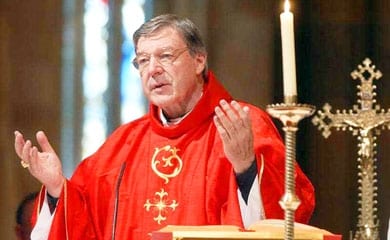
An undisclosed heart condition prevented Cardinal Pell, the third most powerful man in the Catholic Church, from travelling to Australia to appear before the Royal Commission into Institutional Responses to Child Sexual Abuse. As a consequence, his testimony was heard in the heart of Rome, close to the Vatican, and with the eyes of the world watching.
This is no longer a matter solely for Australia and its Commission.
Through Cardinal Pell, the leadership of the Church is under the spotlight. Coincidently this week, Spotlight, a film chronicling the forensic investigation needed to disarm the grooming intimidation of the entire city of Boston, won Best Picture at the Oscars. The Royal Commission process is similarly forensic; it is time for the truth, the whole truth and nothing but the truth.
In Spotlight we felt the emotional impacts of the crimes, the cover-up and evidenced the victimisation of not only the victims but also journalists and lawyers as they sought the truth. The fall-out sent shock waves through the entire community, the trauma to which was substantially compounded by the insidious silencing and secretive power of the Church and its hierarchy
This week, the Pennsylvania Attorney General’s office released a report detailing systemic child sexual abuse over at least four decades by at least 50 priests or religious leaders in the Roman Catholic Diocese of Altoona-Johnstown. The report found that diocesan superiors had covered up the rapes of hundreds of children to protect the church’s image.
Cardinal Pell, whose testimony on day one seemingly better acknowledged the scale and accountability of the Church more broadly, has continued to deny all but minimal possible personal knowledge. He has repeatedly ducked and weaved and evaded and obfuscated. He has remained defensive, emotionally detached and consistently dismissed and minimised the relevance and importance of such matters to him. As a human being and especially as a spiritual leader, working, as the Cardinal stated ‘within the framework of Christian teachings’, one would expect compassion and empathy for those decimated by the Church’s acknowledged systemic failures.
Cardinal Pell’s demeanour stands in stark contrast to the supportive camaraderie of the contingent of Australian survivors, present in the room of the Hotel Quirinale in Rome, as well as the outpouring of empathy and understanding that generated the donations from the Australian community to get them there. To enter the ‘lion’s den’, not only have these victims needed to face their demons, but they are being asked daily to expose the core of their trauma to the world. Yet in that very room, with those men and women in the audience and despite everything we all now know about child sexual abuse, Cardinal Pell stated that the actions of a serial perpetrator, Father Gerald Ridsdale ‘wasn’t of much interest to him’.
Memory is a complex entity and we all have lapses, even those in positions of great power it seems. Yet Cardinal Pell’s lapses are concerning and frequent – he didn’t know whether Ridsdale’s perpetration ‘was common knowledge or whether it wasn’t’; he did know that ‘paedophilia was never mentioned’ but he didn’t know what was mentioned.
Cardinal Pell’s lapses of memory generate real concerns and serious doubts around his evidence, which was described at one point, as ‘implausible’ by Counsel Assisting, Gail Furness.
Pope Francis, in 2015 stated: “The crimes and sins of sexual abuse of minors cannot be kept secret any longer. I commit myself to the zealous watchfulness of the church to protect minors, and I promise that all those responsible will be held accountable.”
Cardinal Pell’s position is untenable, and calls for him to be stood down must be considered by Pope Francis if the Church is to genuinely show us all that it has changed, that secrecy won’t be tolerated and that it does truly prioritise the safety of children, the accountability of those responsible and the needs of survivors.

